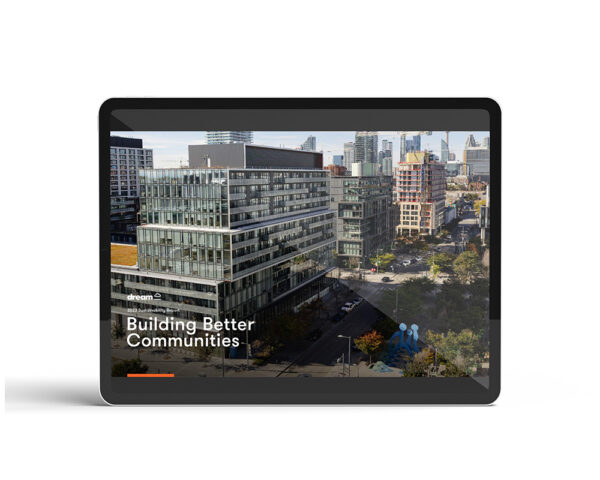2024 Highlights
-
 PRI
PRIScored 4 stars in the Policy, Governance and Strategy and Real Estate modules and 5 stars in the Confidence Building Measures module(1)(2)
-
 GRESB
GRESBScored 79/100 in the 2024 GRESB Real Estate Assessment and placed 1st out of 10 in the Canada Comparison Group in the 2024 GRESB Public Disclosure(3)
-
 2024 FRPO Awards
2024 FRPO AwardsWinner of the Federation of Rental-housing Providers of Ontario (“FRPO”) MAC Award for Impact for Affordable Housing Program Initiative at Canary Landing and Best Curb Appeal for The Residence at Weston
-
 ~$27 million
~$27 millionin spending awarded to diverse businesses(5)
-
 689
689active affordable housing units(6)
(1) DRM completed the submission on behalf of the Dream group of companies, including MPCT.UN.
(2) This information is based on the 2024 Assessment Report provided by the UN-supported Principles for Responsible Investment (PRI). The PRI Assessment is based on self-reported data and reflects the organization’s alignment with the six Principles for Responsible Investment. The PRI does not endorse or certify the ESG performance of its signatories. For further information please see www.unpri.org.
(3) All intellectual property rights to this data belong exclusively to GRESB B.V. All rights reserved. GRESB B.V. has no liability to any person (including a natural person, corporate or unincorporated body) for any losses, damages, costs, expenses, or other liabilities suffered as a result of any use of or reliance on any of the information which may be attributed to it. Green Stars recognize Real Estate entities with a score higher than 50% of the points allocated to each relevant component. The GRESB Public Disclosure Level is based on the 2025 GRESB Public Disclosure dataset. GRESB assessments are based on publicly available ESG disclosures and are provided ‘as is’ without warranty. GRESB does not endorse or certify the ESG performance of any organization.
(4) Donation made by DRM, MPCT.UN’s asset manager.
(5) Diverse vendors are defined as businesses that are majority-owned or majority-managed by people from equity-deserving groups. MPCT.UN collected this information in coordination with DRM and D.UN – and therefore includes tracked spending by MPCT.UN, DRM and D.UN.
(6) At 100% project level. Affordable units are classified in line with certain government program’s affordability definition that each project is governed by.
ESG Scorecard
| Indicator | 2019 Baseline | 2023 | 2024 | YoY% Change | % Change from Baseline |
| Energy | |||||
| Energy Consumption (GJ) | 78,137 | 182,811 | 169,540 | – | – |
| Energy Intensity (GJ/sf)(3) | 0.09 | 0.07 | 0.07 | -9% | -29% |
| Water | |||||
| Water Consumption (m3) | 61,827 | 221,187 | 244,976 | – | – |
| Water Intensity (m3/sf)(3) | 0.06 | 0.04 | 0.06 | 46% | -6% |
| GHG Emissions(4) | |||||
| Scope 1 & 2 GHG Emissions (tCO2e) | 1,602 | 4,871 | 4,866 | – | – |
| Scope 1 & 2 GHG Emissions Intensity (kgCO2e/sf)(3) | 1.92 | 1.29 | 1.46 | 13% | -24% |
| Waste | |||||
| Waste Generation (tonnes) | 222 | 414 | 528 | – | – |
| Waste Diversion rate (%)(2) | 40% | 30% | 52% | 97% | 48% |
| Indicator | 2022 | 2023 | 2024 |
| Employees | 247 | 266 | 270 |
| Voluntary turnover rates | 19% | 20% | 17% |
| Women employees(5) | 46% | 48% | 48% |
| Women managers(6) | 37% | 42% | 43% |
| Women executives(7) | 50% | 63% | 50% |
| Indicator | 2022 | 2023 | 2024 |
| Women Directors(8) | 57% | 63% | 63% |
| Independent Directors(8) | 71% | 88% | 88% |
(1) Unless otherwise stated, annual data for energy, GHG emissions, water and waste reflects the absolute performance of properties owned during the respective calendar year and not like-for-like comparisons. Floor area square footage is based on Gross Leasable Area (“GLA”) as of end of reporting year. Please refer to the ESG Data Book for more
information, including data coverage and sources of emission factors.
(2) Co-owned assets with joint operational control with D.UN are included at 100% of GLA.
(3) Only includes office-type assets with GLA at 100% owned for the full year.
(4) GHG emissions are calculated in accordance with the World Resource Institute Greenhouse
Gas Protocol. This includes emissions from activities under MPCT.UN’s direct and indirect operational control: Scope 1 emissions generated directly from its operations, including heating at the properties. Scope 2 emissions indirectly associated with the consumption of purchased electricity, heating, cooling, and steam consumed by properties. The comparative periods are not presented using the emission factors included in the updated 2025 National Inventory Report, published on May 16, 2025. As such, trends in emissions may be impacted.
(5) As at December 31, 2024.
(6) Includes managers and above.
(7) For the purposes of this report, Executives include: the Chief Responsible Officer and Chief Financial Officer of MPCT.UN.
(8) Board composition as of December 31, 2024.
Sustainability at MPCT.UN is managed by the following(1):
-
Board of Trustees
+
Oversee ESG matters, together with the Board of directors of Dream Impact Master GP Inc., with responsibility of this oversight delegated to the Governance, Compensation and Environmental Committee(2)
-
Governance, Compensation and Environmental Committee of Dream Impact Master GP Inc.
+
Oversee approach to environmental, social, governance and impact investing matters
-
Audit Committee
+
Oversee assurance engagements related to the ESG (environmental, social and corporate governance) matters, including regulatory reporting, internal controls and third-party audits.
-
Portfolio Manager (Highest-level executive with oversight over ESG and impact matters, including sustainability and climate change)
+
Work with the Chief Financial Officer to provide leadership over the sustainability strategy and oversee adoption of the ESG Framework
-
ESG Operating Committee (Members of the Executive Leadership team from each Dream entity)
+
Receive regular updates from the Sustainability and ESG team on behalf of all departments and the sustainability working groups
Adopt ESG Framework
Communicate sustainability strategy across the company and to key external stakeholders
Delegate implementation to Sustainability and ESG team
Reports to the Governance, Compensation and Environmental Committee of Dream Impact Master GP Inc.
-
Sustainability and ESG Team
+
Embed sustainability strategy across the company and with key external stakeholders
Oversee the implementation of the ESG Framework for each Dream entity
Manage portfolio sustainability initiatives including building certifications, energy, water and waste management and monitoring, as well as strategic initiatives
Meet quarterly with the ESG Operating Committee
-
Sustainability Working Groups (Currently includes the Employee Engagement working group)
+
Advance sustainability initiatives and activities at company level
Involve representatives from across functions, regions, and properties and report regularly to the Sustainability and ESG team
-
Investment Committee
+
Review each investment’s Acquisition Checklist and approve investments that meet both financial and impact goals
Hold the project team accountable to achieve goals and create impact
(1) The responsibilities set out in this column are for illustrative purposes only, reflect certain relevant ESG matters, and do not purport to reflect the full extent of responsibilities or the full mandate of any of the boards, committees or teams referred to in this chart.
(2) Based on members of the Trust and GP Boards, as at December 31, 2024. Dream Impact Master GP Inc. is the general partner of Dream Impact Master LP. Dream Impact Master GP Inc. oversees the management of Dream Impact Trust’s operating assets, which are held through Dream Impact Master LP.
Financial Incentives for Emissions Reduction
The Residence at Weston is a multi-residential community located in Toronto’s historic Weston neighborhood and part of Dream Impact’s portfolio. Supported by Canada Mortgage and Housing Corporation’s (“CMHC”) Multi-Unit Loan Insurance (“MLI”) Select program, the project achieved a 15% reduction in GHG emissions and overall energy use in 2024, compared to a 2019 baseline.
In 2024, the property underwent renovations, including installation of double-glazed windows, LED lighting, and Building Automation Systems (“BAS”), improving its energy efficiency. The success of this project earned the Federation of Rental-housing Providers of Ontario (“FRPO”) MAC Award for Best Curb Appeal.

Net Zero Carbon at Zibi
Zibi is a 34-acre community located in Ottawa, Ontario and Gatineau, Quebec overlooking the Ottawa River. The community includes over 4 million sf consisting of residential units, commercial space, riverfront parks and plazas.
In partnership with Hydro Ottawa, Dream developed the Zibi Community Utility District Energy System, the region’s first post-industrial waste heat recovery system, which aims to meet 100% of the community’s energy needs through post-industrial waste heat recovery and river-source cooling.
In 2024, Zibi’s GHG emissions were an impressive 88% lower than those of the reference building defined by the National Energy Code of Canada for Buildings (NECB) 2015. The remaining Scope 1 and Scope 2 emissions amounting to around 140 tonnes CO2e were offset through the purchase of Renewable Energy Credits.

Leading with Resource Efficiency at 723 Bloor St W
Constructed in 1920, 723 Bloor Street West is a historic four-storey apartment building with 16 units in Toronto’s Palmerston-Little Italy neighborhood.
In 2024, this asset underwent a significant deep retrofit to its existing lighting, electrical, and HVAC systems, preserving its historical charm while enhancing thermal comfort and energy efficiency. The updates included LED lighting, airsource heat pumps for suite heating and cooling, low-flow water fixtures and electrified domestic hot water systems using heat pump technology. These upgrades resulted in annual utility cost savings of CAD $5,300, a reduction of 79,500 kWh in electricity usage, and savings of 33,900 m³ of natural gas. GHG emissions were reduced by 62 tonnes CO2e, a 75% reduction, with a total energy reduction of 56%.
The project was executed with the help of partners Bondi Energy, Applied System Technologies, Toronto Hydro, and Pretium Engineering. Dream Impact’s ambition to achieve resource efficiency sets a benchmark for multifamily residential buildings, demonstrating how thoughtful upgrades can drive operational efficiency and tenant satisfaction.

Sustainability Reports
- Previous years +
-
Policies
+
Declaration of Trust
Dream Impact Trust’s Declaration of Trust governs our operations and includes such topics as investment guidelines and operating policies, financing restrictions, units and distributions, and the responsibilities and obligations of the Trustees.
Disclosure PolicyThe objective of our disclosure policy is to ensure that communications to the investing public about Dream Impact Trust are timely, factual and accurate, and disseminated in accordance with all applicable legal and regulatory requirements. The policy covers topics including trading restrictions and blackout periods, confidentiality, and designated spokespersons. This policy applies to all trustees, directors, officers and employees of Dream Impact Trust and its subsidiaries, including trusts and partnerships in which Dream Impact Trust owns directly or indirectly.
Code of ConductOur Code of Conduct (the “Code) is our statement of the values and principles that guide us in our day-to-day business activities. The keystones are: integrity, respect, fairness, accountability and transparency. The Code supports our commitment to operate our business at the highest level of legal, moral and ethical standards. The Code applies to all directors, trustees, officers and employees of Dream Impact Trust and subsidiaries.
Whistleblower PolicyAt Dream Impact Trust, we are steadfast in our commitment to maintaining the highest business and personal ethical standards by dealing openly and honestly with our investors, tenants, suppliers and employees. With our Whistleblower Policy we marry this commitment to that of securities laws and regulations with respect to accounting standards and internal control standards. We have contracted EthicsPoint Inc., an independent service provider, to manage any complaints or concerns on our behalf. This service reports directly to the Audit Committee of the Trust Board of Dream Impact Trust and is available seven (7) days a week, 365 days a year. Any concerns may be reported directly, confidentially, and, if preferred, anonymously, through www.ethicspoint.com.
Majority Voting PolicyThe Trust has a majority voting policy, requiring that each Trustee nominee receive the support of a majority of the total number of votes cast by the unitholders entitled to elect such Trustee nominee, failing which such Trustee shall submit his or her resignation to the Board for consideration.
Advance Notice RegulationThe Trust has adopted an Advance Notice Regulation intended to: (i) facilitate orderly and efficient annual general or, where the need arises, special, meetings; (ii) ensure that all unitholders receive adequate notice of trustee nominations and sufficient information with respect to all nominees; and (iii) allow unitholders to register an informed vote.
Diversity Inclusion u0026 Advancement CommitmentAs one of Canada’s leading real estate companies, we always invest with purpose, embracing creativity and diversity, passion and innovation, while positively impacting our communities and the world around us.
Board Diversity PolicyEach of Dream Impact Trust and Dream Impact Master GP Inc. seek to maintain a Board comprised of talented and dedicated trustees or directors whose skills and backgrounds reflect the diverse nature of the business environment in which Dream Impact operates. Accordingly, the composition of the Boards is intended to reflect a diverse mix of skills, experience, knowledge and backgrounds, including an appropriate number of women trustees and women directors.
* All intellectual property rights to this data belong exclusively to GRESB B.V. All right reserved. GRESB B.V. has no liability to any person (inclusing a natural person, corporate or unincorporated body) for any losses, damages, costs, expenses or other liabilities suffered as a result of any use of or reliance on any of the information which may be attributed to it.









